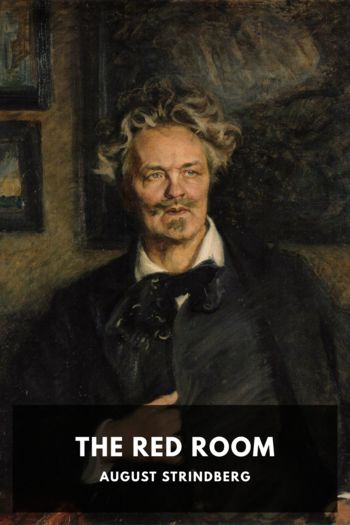The Red Room August Strindberg (best english novels to read txt) 📖

- Author: August Strindberg
Book online «The Red Room August Strindberg (best english novels to read txt) 📖». Author August Strindberg
Falk was both amused and annoyed. He was searching the limbo of memory for philosophical airguns, when he caught sight of Olle Montanus, whose convulsed face betrayed his desire to speak. Falk loaded his gun at random with Aristotle and fired.
“What do you mean by adequate? I cannot recollect that Aristotle made use of that word in his Metaphysics.”
Absolute silence fell on the room; everybody felt that a fight between the artist’s colony and the University of Upsala was imminent. The interval was longer than was desirable, for Ygberg was unacquainted with Aristotle and would have died sooner than have admitted it. As he was not quick at repartee, he failed to discover the breach which Falk had left open; but Olle did, caught Aristotle with both hands and flung him back at his opponent.
“Although I’m not a learned man, I venture to question whether you, Mr. Falk, have upset your opponent’s argument? In my opinion adequate may be used and accepted as a definition in a logical conclusion, in spite of Aristotle not having mentioned the word in his Metaphysics. Am I right, gentlemen? I don’t know, I’m not a learned man and Mr. Falk has made a study of these things.”
He had spoken with half-closed eyelids; now he closed them entirely and looked impudently shy.
There was a general murmur of “Olle is right.”
Falk realized that this was a matter to be handled without mittens, if the honour of Upsala was to be safeguarded; he made a pass with the philosophical pack of cards and threw up an ace.
“Mr. Montanus has denied the antecedent or said simply: nego majorem! Very well! I, on my part, declare that he has been guilty of a posterius prius; when he found himself on the horns of a dilemma he went astray and made a syllogism after ferioque instead of barbara. He has forgotten the golden rule: Caesare camestres festino baroco secundo; and therefore his conclusion became weakened. Am I right gentlemen?”
“Quite right, absolutely right,” replied everybody, except the two philosophers who had never held a book of logic in their hands.
Ygberg looked as if he had bitten on a nail, and Olle grinned as if a handful of snuff had been thrown into his eyes; but his native shrewdness had discovered the tactical method of his opponent. He resolved not to stick to the point, but to talk of something else. He brought out everything he had learned and everything he had heard, beginning with the Criticism of Fichte’s Philosophy to which Falk had been listening a little while ago from behind the fence. The discussion went on until the morning was nearly spent.
In the meantime Lundell went on painting, his foul pipe snoring loudly. The model had fallen asleep on the broken chair, his head sinking deeper and deeper until, about noon, it hung between his knees; a mathematician could have calculated the time when it would reach the centre of the earth.
Sellén was sitting at the open window enjoying himself; but poor Falk, who had been under the impression that this terrible philosophy was a thing of the past, was compelled to continue throwing fistfuls of philosophic snuff into the eyes of his antagonists. The torture would never have come to an end if the model’s centre of gravity had not gradually shifted to one of the most delicate parts of the chair; it gave way and the Baron fell on the floor. Lundell seized the opportunity to inveigh against the vice of drunkenness and its miserable consequences for the victim as well as for others; by others he meant, of course, himself.
Falk, anxious to come to the assistance of the embarrassed youth, eagerly asked a question bound to be of general interest.
“Where are the gentlemen going to dine?”
The room grew silent, so silent that the buzzing of the flies was plainly audible; Falk was quite unconscious of the fact that he had stepped on five corns at one and the same moment. It was Lundell who broke the silence. He and Rehnhjelm were going to dine at the Sauce-Pan, their usual restaurant, for they had credit there; Sellén objected to the place because he did not like the cooking, and had not yet decided on another establishment; he looked at the model with an anxious, inquiring glance. Ygberg and Montanus were too “busy” and “not going to cut up their working-day” by “dressing and going up to town.” They were going to get something out here, but they did not say what.
A general dressing began, principally consisting of a wash at the old garden-pump. Sellén, who was a dandy, had hidden a parcel wrapped in a newspaper underneath the bed-sofa, from which he produced collar, cuffs and shirtfront, made of paper. He knelt for a long time before the pump, gazing into the trough, while he put on a brownish-green tie, a present from a lady, and arranged his hair in a particular style.
When he had rubbed his shoes with a bur leaf, brushed his hat with his coat sleeve, put a grape-hyacinth in his buttonhole and seized his cinnamon cane, he was ready to go. To his question whether Rehnhjelm would be ready soon, Lundell replied that he would be hours yet, as he required his assistance in drawing; Lundell always devoted the time from twelve to two to drawing. Rehnhjelm submitted and obeyed, although he found it hard to part with Sellén, of whom he was fond, and stay with Lundell whom he disliked.
“We shall meet tonight at the Red Room,” said Sellén, comforting him, and all agreed, even the philosophers and the moral Lundell.
On their way to town Sellén initiated his friend Falk





Comments (0)